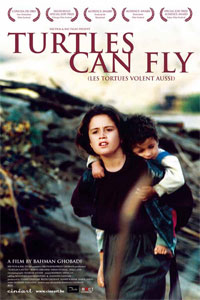Film Reviews
 Turtles Can Fly (2004)—Kurdish
Turtles Can Fly (2004)—Kurdish
Kurdish director Bahman Ghobadi situates this poignant film in a Kurdish refugee camp on the Turkish-Iraq border just before the outbreak of the US-Iraq war. The film revolves around a 13-year old boy nicknamed "Satellite" for his enterprising ways. Satellite barters, buys and installs TV dishes so the village can get foreign news about rumors of war. He organizes the village children into an economic cartel. They clear fields of land mines, which they then resell, and stack discarded empty artillery casings. Parallel to this big picture of village life among displaced Kurds runs an important smaller story. Satellite has a crush on the orphaned girl Arin, who along with her armless brother Hengov takes care of the blind toddler Risa whom she bore when she was raped by Iraqi soldiers. Only in the last few minutes of the film does the war begin, and of course the Kurds were happy for liberation from Saddam by America. But when you learn what happens to Satellite, Arin, Hengov and little Risa, you understand why in the final scene Satellite turns his back on the American army vehicles as they roar through the muddy village in the rain, as his buddy exclaims, "I thought you always wanted to see the Americans." I think Ghobadi intends a deeply human commentary rather than a political statement, to the effect that seen through the surreal experiences of these children, war is hell on earth. It is difficult to know which is more real or more terrifying, the nightmares that Hengov has or the "reality" of their waking hours. In Kurdish with English subtitles.
Dan Clendenin: dan@journeywithjesus.net


